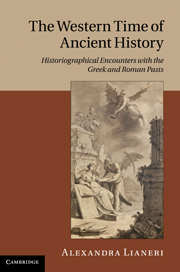Book contents
- Frontmatter
- Contents
- Acknowledgements
- Notes on contributors
- INTRODUCTION
- THEORISING WESTERN TIME: CONCEPTS AND MODELS
- 1 Time's authority
- 2 Exemplarity and anti-exemplarity in early modern Europe
- 3 Greek philosophy and Western history: A philosophy-centred temporality
- 4 Historiography and political theology: Momigliano and the end of history
- ANCIENT HISTORY AND MODERN TEMPORALITIES
- UNFOUNDING TIME IN AND THROUGH ANCIENT HISTORICAL THOUGHT
- AFTERWORD
- Bibliography
- Index
2 - Exemplarity and anti-exemplarity in early modern Europe
from THEORISING WESTERN TIME: CONCEPTS AND MODELS
Published online by Cambridge University Press: 03 May 2011
- Frontmatter
- Contents
- Acknowledgements
- Notes on contributors
- INTRODUCTION
- THEORISING WESTERN TIME: CONCEPTS AND MODELS
- 1 Time's authority
- 2 Exemplarity and anti-exemplarity in early modern Europe
- 3 Greek philosophy and Western history: A philosophy-centred temporality
- 4 Historiography and political theology: Momigliano and the end of history
- ANCIENT HISTORY AND MODERN TEMPORALITIES
- UNFOUNDING TIME IN AND THROUGH ANCIENT HISTORICAL THOUGHT
- AFTERWORD
- Bibliography
- Index
Summary
The principal aim of this chapter is to discuss the relation between historical thought in the Renaissance and François Hartog's three regimes of historicity, thinking with and occasionally against his central concept. To anticipate the conclusion, the chapter will argue that historical thought and writing in early modern times (more or less 1350–1750) had distinctive characteristics of its own. It was a kind of regime within Hartog's spacious first regime, extending from Homer to Chateaubriand or from the Achsenzeit to the Sattelzeit.
One of the major features of this first regime is the idea of history as a storehouse of exempla offering a guide to life: historia magistra vitae, as Cicero wrote in his treatise De oratore. Like the late Reinhard Koselleck, Hartog argues that early modern European readers and writers believed in what he calls ‘the authority of the past’. Like their classical and medieval predecessors, these readers and writers believed in a usable past, claiming or assuming that history offered a repertoire of exempla. The assumption was abandoned after (and in part thanks to) the events of 1789, which offered the prospect of a future so different from the past that earlier models became irrelevant. Hence Koselleck speaks of the ‘dissolution’ (Auflösung) of the Ciceronian topos in the course of what he called the Sattelzeit of the late eighteenth century, the frontier zone between traditional and modern culture.
- Type
- Chapter
- Information
- The Western Time of Ancient HistoryHistoriographical Encounters with the Greek and Roman Pasts, pp. 48 - 59Publisher: Cambridge University PressPrint publication year: 2011
- 7
- Cited by

